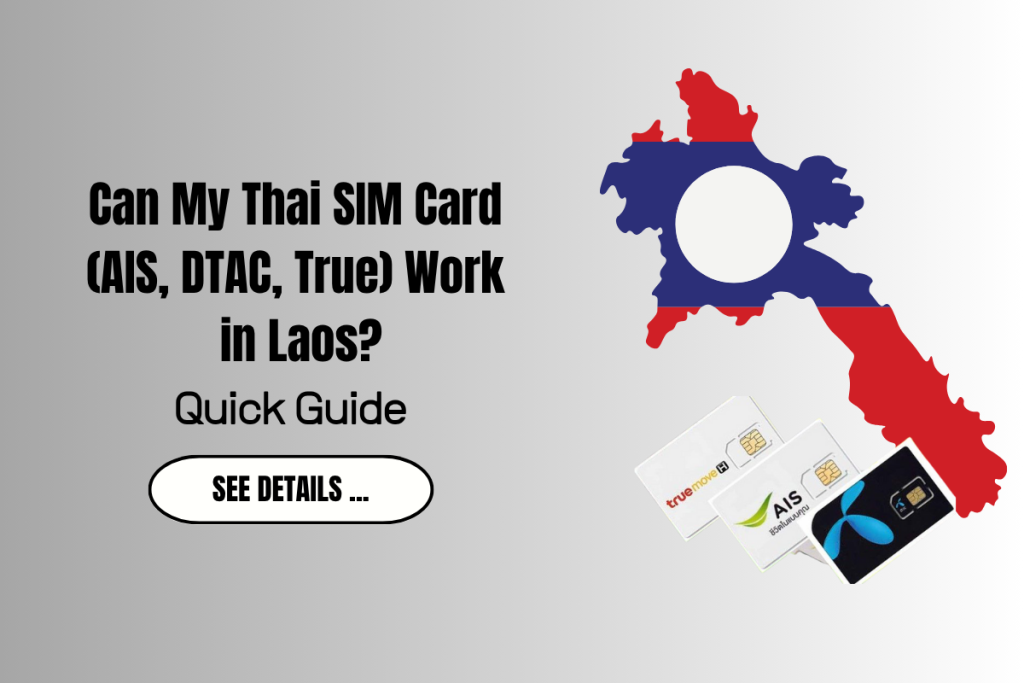When traveling from Thailand to Laos, one of the most common questions is “Can my Thai SIM card (AIS, DTAC, True) work in Laos?” The good news is yes—all major Thai mobile carriers offer roaming services in Laos, but you’ll need to activate the right package before crossing the border. This guide explains how to prepare your AIS, DTAC, or TrueMove H SIM card for international roaming, compares the affordable border packages available, and provides step-by-step activation instructions to help you stay connected without excessive charges during your Laotian adventure.

I. Do AIS, DTAC, and True Work in Laos?
Yes, all major Thai mobile carriers—AIS, DTAC, and True—work perfectly in Laos through international roaming services. Your Thai SIM card will keep you connected with calls, text messages, and mobile data throughout your Laos trip.
When crossing into Laos, your phone will automatically connect to partner networks like Unitel or Lao Telecom. The connection process happens seamlessly in most areas, especially in cities and tourist destinations.
To use your Thai SIM card in Laos:
- Enable data roaming in your phone settings before arrival
- Purchase a roaming package through your carrier’s app or service center
Without activating a specific roaming package, you might face surprisingly high charges for data usage. Most Thai carriers offer special Laos roaming packages that provide better value than standard roaming rates, so check your provider’s website or app for current options before traveling.
II. How to Activate Roaming for Laos
Before crossing the border into Laos, you’ll need to ensure your Thai SIM card is ready for international roaming. Each major Thai carrier has a specific activation process to keep you connected during your trip.
| Carrier | Activation Method | Status Check | Roaming Package | Price (THB, excl. VAT) | Data | Duration | Speed After Data Depletion | Network Partners in Laos | eSIM Support |
| AIS | myAIS app or 111407# | 1116# | Ready2Fly Border Non-Stop Data Roaming Package | 93 | 2GB | 7 days | 64 Kbps | Automatically connects to Unitel or LTC | Yes |
| DTAC | dtac app or pre-purchase | No specific information | GO Travel package (Neighboring) | 99 | 2GB | 7 days | 128 Kbps | Automatically connects to Unitel or LTC | Yes |
| TrueMove H | True App or 868100*4#/399884# | No specific information | GO Travel package for Cambodia, Laos, and Malaysia | 99 | 2GB | 7 days | 128 Kbps | Automatically connects to Unitel or LTC | Yes |
III. eSIM for Laos – A Smart Alternative
An eSIM offers a hassle-free solution that’s gaining popularity among savvy travelers. Unlike traditional SIM cards, this digital alternative eliminates the need to swap physical cards while keeping you connected throughout your journey.
An eSIM from LaoseSIM offers a hassle-free solution that’s gaining popularity among savvy travelers.
Simply purchase online (plans range from $5.50 for 5 days/10GB to $12.90 for 15 days/30GB), receive a QR code via email, and scan it with your compatible device. Your eSIM connects to major Laos networks immediately upon arrival.
This option is ideal for digital nomads, longer-term visitors, and anyone who wants to maintain their home phone number while using local data. Most newer smartphones support this technology, making it an accessible choice for travelers seeking affordable connectivity without hunting for a local SIM card store.
IV. How to Save on Roaming Charges
International roaming charges can quickly add up during your travels, sometimes resulting in an unwelcome surprise on your phone bill. Fortunately, there are several practical strategies to keep these costs under control:
- Purchase a roaming package before leaving home. Most carriers offer special international plans that are significantly cheaper than standard roaming rates. Activating these packages before your trip can save you up to 70% compared to pay-as-you-go rates.
- Connect to WiFi whenever possible. Hotels, cafés, airports, and many public spaces offer free WiFi. Using these networks for data-heavy activities like video calls or social media browsing helps preserve your mobile data allowance.
- Disable background data and auto-syncing features. Many apps continue to use data even when you’re not actively using them. Go to your phone’s settings to turn off auto-updates, cloud syncing, and background refreshing for non-essential apps.
- Download essential content before your trip. Save offline copies of maps, translation dictionaries, travel guides, music playlists, and entertainment content while on your home network to avoid downloading them using expensive roaming data.
- Consider an eSIM solution. Digital eSIMs allow you to add a local data plan without removing your physical SIM card. This option typically offers much better rates than traditional roaming while letting you keep your home number active for calls and texts.
With a bit of preparation and these simple techniques, you can stay connected abroad without breaking the bank.
V. FAQs
Can I use mobile data when roaming?
Yes, but it’s expensive without a package. Standard roaming data rates typically range from 300-600 THB per MB, making casual browsing extremely costly.
Is an eSIM better than roaming?
Yes, especially for longer stays or heavy data use. eSIMs typically offer 10-30GB of data for the same price as a 1-2GB roaming package from Thai carriers.
Can I keep using my Thai number with an eSIM?
Yes, if your phone supports dual SIM/eSIM functionality. This setup allows you to receive important calls on your Thai number while enjoying cheaper local data rates.